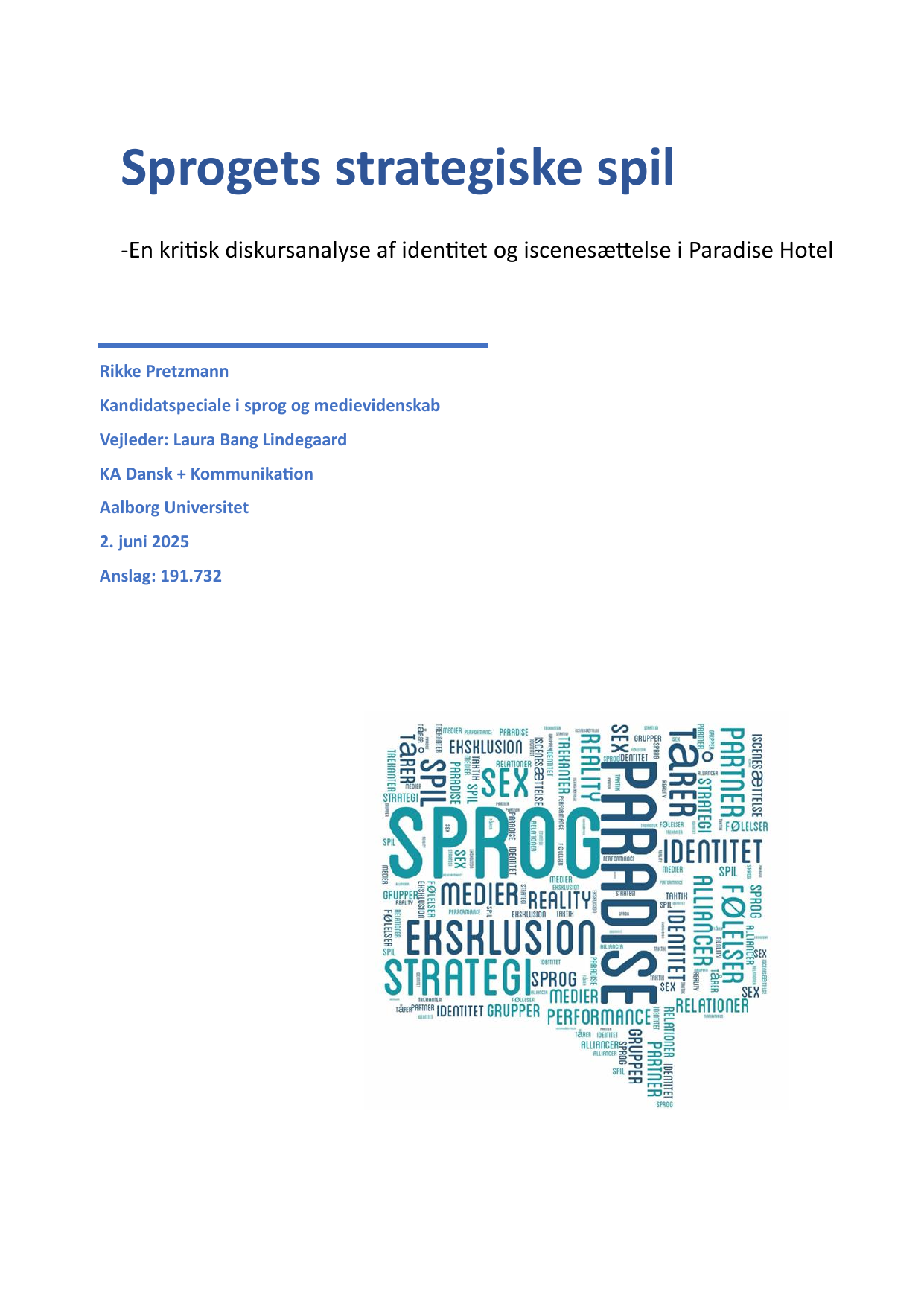
Sprogets strategiske spil: En kritisk diskursanalyse af identitet og iscenesættelse i Paradise Hotel
Oversat titel
The Strategic Game of Language
Forfatter
Semester
4. semester
Uddannelse
Udgivelsesår
2025
Afleveret
2025-06-02
Antal sider
80
Abstract
This master’s thesis, The Strategic Game of Language, focuses on how the contestants in the Danish reality program Paradise Hotel negotiate and perform identity across thirteen selected episodes from season 21 (2025). The analysis explores the linguistic and communicative strategies used by the contestants, and how the premisses of the realityformat, amongst others staging, competition and media awareness influence their performative use of language and construction of identity. An especially strong focus is how the contestants establish in- and outgroups and how these contribute to different positionings in the social logics of the game. In order to examine how the contestants of Paradise Hotel season 21, negotiate and stage their identity through the use of language, and thus answer this thesis’ problem statement, the thesis will introduce the central theories used to highlight perspectives on how identity is negotiated in a mediated context. The thesis furthermore combines theoretical approaches to identity, communication and performance and is methodologically grounded in Norman Fairclough’s three-dimensional model for Critical Discourse Analysis (CDA). Fairclough´s model uses verbal microanalysis in broader social and cultural contexts and enables a multi-layered analysis of how verbal choices are both shaped by, and contributing to the norms and scope of the media format. The analysis is structured into three parts, following Fairclough’s trisection; text, discursive practice and sociocultural practice. At the level of discursive practice, the analysis examines how the program establishes its medial universe and which structures influence the linguistic positioning of the contestants. Additionally, Fairclough’s understanding of textual production is combined with Benwell and Stokoe’s theory of identity as a negotiation practice, Goffman’s participation framework, Austin’s theory of performative utterances, Potter’s theory of fact construction and Tajfel’s theory of social identity. The thesis shows how both contestants and production team contribute to staging gendered roles, competition and authenticity through linguistic practices. At the textual level, the analysis examines how the contestants´ specific utterances function as strategic and performative acts of speech. Grounded in terms from Svennevig, Femø Nielsen and Potter, judgemental and emotional expressions contributing to the establishment of social groups, legitimacy and identity positions are analysed. These expressions are not merely thought of as opinions, but also as an active resource whereby the contestants place themselves and others as either ‘worthy’ or ‘unworthy’ players of the game. The analysis shows how language used in Paradise Hotel not only reflects but also reproduces emotions and identity- in close interplay with the dramaturgy and cultural codes of the format. At the level of sociocultural practice, the linguistic practice of the contestants is contextualized into broader societal discourses of performance, authenticity and staging. At this level Petersen and Krogh’s theory of performance culture and Hollenbaugh’s understanding of strategic identity performance in mediated spaces is used. The analysis furthermore shows how the phrases such as ‘to play the game’ (‘at spille spillet’) and ‘to soak up the sun’ (‘at være på badeferie’) function as linguistic markers for moral, engagement and worthiness, and how these are used to legitimize positions in the social hierarchy of the program. Thus, this thesis concludes that the language used in Paradise Hotel is not merely acts of communication, but a performative and strategic resource in the negotiation of identity. Through linguistic choices and positionings, the contestants create both in- and outgroups and negotiate their social identities in a mediated reality television universe. Moreover, the analysis clarifies how identity in reality television is the result of collaboration between the framing of the production, the contestants’ linguistic utterances and the cultural norms and expectations of society. Finally the thesis concludes that the participants in season 21 of Paradise Hotel negotiate and perform social identity. The analysis shows that they employ linguistic strategies to establish positions, in- and out-groups, as well as emotionally and morally grounded self-presentations. The premises of the reality format – including authenticity, strategy, and media awareness – play a central role in the construction of the participants’ social identities, and language functions as an active and performative tool in this process. Thus, it becomes clear that identity in reality television is not merely expressed, but actively negotiated and produced in interaction with genre conventions and cultural norms.
